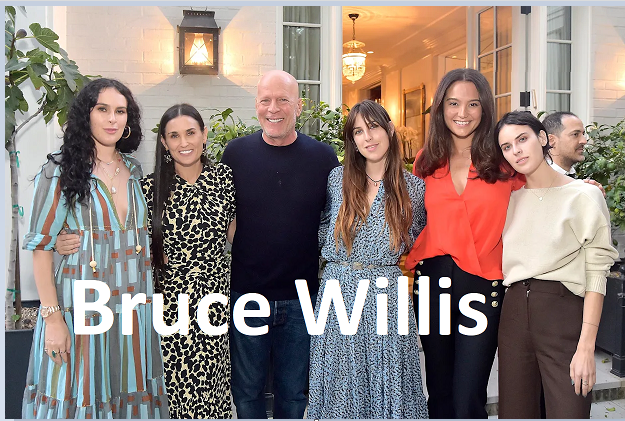Bruce Willis: A Hollywood Icon Whose Legacy Transcends the Screen

Few actors in Hollywood can boast the same mix of charisma, talent, and staying power as Bruce Willis. With a career spanning decades, Willis has become synonymous with action films, tough-guy roles, and unforgettable one-liners. But beyond the on-screen persona, he is a complex figure—an actor who has shown vulnerability, humor, and versatility throughout his career.
In this article, we’ll dive deep into Bruce Willis’s life, his journey through Hollywood, his most iconic roles, and the lasting impact he continues to have on the entertainment industry.
Early Life and Humble Beginnings
Bruce Willis was born on March 19, 1955, in Idar-Oberstein, West Germany, where his father was stationed with the U.S. military. The family later relocated to New Jersey, where Willis grew up. Unlike many actors who knew from childhood they wanted to pursue Hollywood, Willis’s path was less straightforward.
As a teenager, Willis dealt with a stutter, which made speaking in public a challenge. Interestingly, it was through acting in school plays that he discovered a way to overcome his speech impediment. This breakthrough not only gave him confidence but also sparked his interest in performing.
Before making it big, Willis worked odd jobs, including as a security guard and a private investigator. But he also spent time honing his craft in theater and small roles, determined to make a career out of acting. These humble beginnings show that Willis didn’t just stumble into fame—he fought for it through perseverance and grit.
Breaking Into Hollywood
:max_bytes(150000):strip_icc():focal(721x419:723x421)/bruce-willis-emma-heming-willis-MotherlessBrooklyn-052725-tout-38d214a4bf2a4ff49be3e1276f1f6ea9.jpg)
Bruce Willis’s breakthrough came in the mid-1980s with the television series Moonlighting (1985–1989). Starring opposite Cybill Shepherd, Willis played the wisecracking detective David Addison. The show was a hit, not just for its clever writing but also because of Willis’s magnetic presence. His humor, charm, and sharp timing made him a standout, and it wasn’t long before Hollywood took notice.
What made Moonlighting so important was that it gave Willis an identity beyond just another TV actor. He wasn’t afraid to play flawed characters who mixed vulnerability with toughness, a trait that would later define many of his film roles.
By the late 1980s, Willis had made the leap to the big screen. While his first few roles gained moderate attention, it was a single movie in 1988 that forever changed his career—and Hollywood action cinema.
The Die Hard Legacy
When people think of Bruce Willis, the first thing that often comes to mind is Die Hard. Released in 1988, the film introduced the world to John McClane, a New York cop caught in a high-rise terrorist takeover on Christmas Eve.
Unlike the overly invincible action heroes of the time, McClane was relatable. He wasn’t indestructible—he got hurt, he bled, he was scared—but he kept fighting. Bruce Willis brought humanity to the action genre, giving audiences a hero who felt real. His witty one-liners, including the now-famous “Yippee-ki-yay,” became part of pop culture history.
The success of Die Hard not only made Willis a global star but also redefined the action movie genre. The film spawned multiple sequels and cemented McClane as one of cinema’s most beloved action heroes. To this day, Die Hard is considered a classic, often debated as the ultimate Christmas movie.
Versatility Beyond Action Roles
While Willis became famous for his tough-guy persona, his career is much more versatile than many realize. He has starred in comedies, dramas, and even family films, proving that he’s not just a one-note actor.
In 1994, he appeared in Quentin Tarantino’s Pulp Fiction, playing Butch Coolidge, a washed-up boxer caught in a web of chaos. The role showed Willis’s ability to take risks and embrace unconventional characters, earning him critical acclaim.
He also starred in The Sixth Sense (1999), one of his most celebrated performances. As Dr. Malcolm Crowe, a child psychologist helping a boy who claims to see dead people, Willis brought depth, subtlety, and emotion to the role. The film became a massive success, and its iconic twist ending remains one of the most talked-about in movie history.
These roles proved that Willis was more than just an action star—he was a multifaceted actor capable of handling complex characters and emotional storylines.
Personal Life and Challenges
Off-screen, Bruce Willis’s personal life has also drawn public attention. He married actress Demi Moore in 1987, and together they had three daughters—Rumer, Scout, and Tallulah. The couple’s marriage was highly publicized, and although they divorced in 2000, they remained close friends and committed co-parents. Their modern family dynamic, which later included Willis’s second wife Emma Heming and more children, is often praised as an example of blended family harmony.
However, Willis’s journey has not been without challenges. In recent years, news broke that he had been diagnosed with aphasia, a condition that affects speech and cognitive abilities. This led to his decision to step away from acting in 2022. Later, his family revealed that his diagnosis had progressed to frontotemporal dementia (FTD), a degenerative brain condition.
This announcement deeply saddened fans worldwide, but it also sparked an outpouring of love and support. People recognized the immense contributions Willis had made to cinema and celebrated his career, even as he faced personal health battles.
Bruce Willis’s Cultural Impact
Bruce Willis is more than just an actor—he is a cultural icon. His films have grossed billions worldwide, and his characters continue to inspire generations of moviegoers. He reshaped the image of the action hero, making them more human and relatable.
Moreover, Willis’s influence extends beyond movies. His style, humor, and resilience have become part of his legacy. From late-night talk shows to music albums—yes, Willis also dabbled in music with The Return of Bruno—he showed audiences that he wasn’t afraid to try new things.
Even today, his catchphrases, especially from Die Hard, remain embedded in pop culture. Whether through parody, homage, or direct references, Bruce Willis’s impact is inescapable.
The Enduring Legacy of Bruce Willis
Though Bruce Willis has retired from acting due to health reasons, his body of work ensures that his legacy will live on. From Moonlighting to Die Hard, from Pulp Fiction to The Sixth Sense, he has given audiences performances that range from explosive action to quiet, emotional depth.
What makes Willis truly iconic is not just his roles but the way he connected with audiences. He wasn’t the perfect, untouchable hero—he was the everyman who fought against the odds. That relatability is what makes his characters timeless.
As fans revisit his films, it becomes clear that Bruce Willis will always remain a central figure in Hollywood history. His story reminds us of the power of perseverance, talent, and authenticity.
Conclusion: More Than Just an Action Star
Bruce Willis is one of those rare actors whose name alone evokes an entire era of cinema. He is not only the face of action films but also an artist who proved he could handle complex roles with grace. His personal journey—from overcoming childhood challenges to becoming a global superstar—speaks to resilience and determination.
Today, even as he steps back from the spotlight due to health struggles, his legacy is untouchable. His films continue to inspire, entertain, and thrill audiences around the world. For many, Bruce Willis will always be remembered not just as John McClane, but as one of the most versatile and beloved actors in Hollywood.



